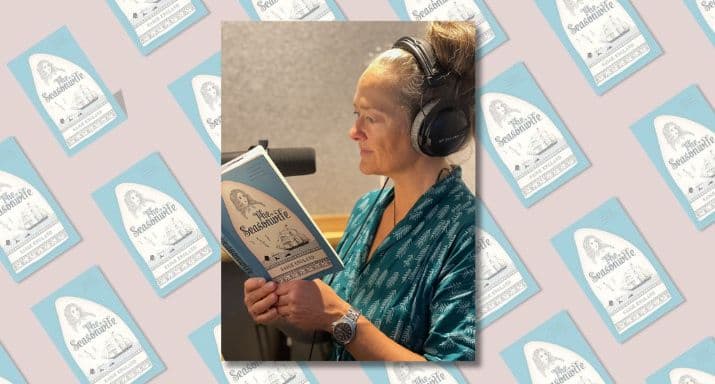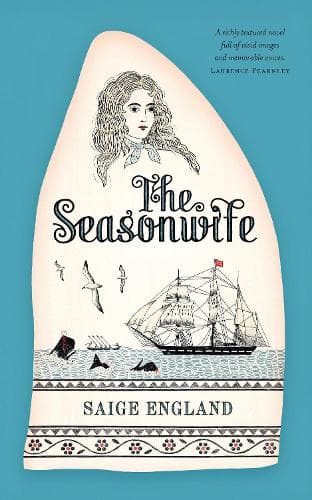Behind the scenes on an audiobook recording with Elisabeth Easther

Actress, journalist author and playwright Elisabeth Easther might be a familiar face from her role as Carla Crozier on Shortland Street. She'll also be a familiar voice to audiobook lovers, narrating dozens of New Zealand books. She takes Kete behind the scenes recording The Seasonwife by Saige England.
Of all her many jobs, Elisabeth Easther says that recording audiobooks is her all-time favourite gig because it's hard to beat being paid to read a book. Having started out narrating what used to be called 'talking books' at The Royal NZ Foundation of the Blind, now Blind Low Vision NZ, over the years, Elisabeth has lost count of the number of books she has recorded. Now that local publishers are leaning into the increasing demand for audiobooks, there's been a bit of a boom in this line of work, and Elisabeth and her narrator colleagues couldn't be happier.
How would you describe your narration style?
Because most local audiobooks have modest budgets, there's not the luxury of endless time to finesse accents, so I find it safer to do what I describe as 'broad brushstrokes.' This means the narrated text will have quite a neutral accent, and with dialogue, the listener will never be confused about who is talking. For example, although someone from Cork or Cardiff might not think it's the most convincing Irish or Welsh accent they've ever heard, the story's emotional truth is always honoured. Personally, I'd rather a character's voice be pleasant to listen to and read well than technically 'perfect'.
What preparation do you do before reading an audiobook?
Again, budget-related, most narrators tend to do a cursory read prior, as well as some marking up of the text for complicated words, or foreign languages. As much as this gig is a joy, you're only paid for the time you're in the studio, so if you add another twenty or so unpaid hours to the job, it doesn't make financial sense. So, absolutely, you read the book prior, but not a deep, deep dive. I will also initial some dialogue where it's unclear who is speaking each line and write out complex pronunciations phonetically. Listening to accent tutorials on YouTube can also be helpful, but I never feel fully confident with the robot pronunciation of tricky words.
Was there anything particularly challenging with The Seasonwife?
Before I started, I had a few conversations with Saige England, the author, which was very satisfying. Who doesn't like chatting with authors about their books and characters? But like a lot of books set in colonial Australia and New Zealand, there were a lot of accents as well as te reo Māori. For example, one character in The Seasonwife was born in Ireland but taken to England at age nine, then he became an Anglican priest who moves to Australia and spends time in New Zealand. Conscious that an English accent would get him further in life than an Irish, I had to think about how to cover that, but for the sake of simplicity, I made him sound more English. Also, there was quite a bit of Gaelic, including some archaic Gaelic. No matter where we looked on the internet, we could not find anyone reading those bits, so Saige's friend Martin, a Gaelic speaker, helped us out. If you know anything about Gaelic, you'll know the pronunciation can be challenging for an English speaker. For example, bean sídhe is pronounced banshee, so the Gaelic was a learning curve!
Do you get feedback from the publisher and author?
Not usually, although it makes sense if the author wants to talk before the recording, during the recording sessions, the narrator is very dependent on their producer who not only presses all the buttons – I am not techie – they also ensure the voice, the levels, are match from one session to the next. They are also a vital extra pair of ears and eyes as it's amazing how your brain can play tricks and you might say 'machete' instead of 'confetti' for example, and not notice, but the producer will, and you'll go back and listen, and realise you'd said another word entirely than what was written. We couldn't do it without good producers. I am forever in their debt, and they're all great company, too. Then, the finished recording is listened to by another set of proofreading ears, who will catch any errors that need correcting.
Usually, there'll be a half-hour session of mopping up from that fresh set of ears. I've also learned only recently that a robot does a listen as well, and it takes out all the breaths and clicks and tummy rumbles and odd sounds, which was a revelation, as I don't feel so self-conscious now about swallows and inhales. So robots aren't all bad; I don't want the day to come when they record the books, let alone write them – sorry, robots! You can have your own canon, but please let the humans keep doing the art for now.
How long does it take to record an audiobook - how much can you read in a day?
Sometimes, the book needs to be done relatively speedily, which will often feel like the book is being done a disservice, but in a perfect world, a good pace tends to mean recording in three-hour sessions, which is a good amount for my voice to handle in one go. If I'm doing longer than three hours, there needs to be food to stop the tummy rumbling audibly, but not something that clogs the vocal cords, so no blue cheese or milkshakes. I tend to pack a boiled egg at the very least when narrating for more than two hours. In three hours, most readers tend to get through between forty to sixty pages. It all depends on how it's flowing and how complex the story is.
I always try to get a good night's sleep before recording, too, as you definitely make more stumbles if you're not feeling frisky. Ideally, I'll also cycle to a recording session so my body is warmed up, which is also important for the voice.
How does reading an audiobook compare to other acting work?
I love reading aloud, it's the best job in the world. You don't have to dress up or put on a face, and you get to tell stories using the simplest medium. The voice. Reading audiobooks also keeps me fit for commercial voiceover work, so it's really easy when I turn up to extol the virtues of chocolate or a sock and I have to do a cold read. Recording an audiobook is also quite different to acting with other people, it feels private and secluded, in a good way. As a closet introvert, I really like it… but I still love acting with others.
Does reading books aloud help with your own writing?
Absolutely, because you really see what works and what doesn't when you read aloud. You can't hide an awkward sentence if it's read aloud. It's also the best proofreading tool, so when I'm writing, I'm always muttering the text to myself when I get closer to a final draft. I often wish publishers could have the book recorded first. As narrator and producer combined, we are like a fine-tooth comb.
Of course, all reading helps the writing. Still, my little mini freak out I'm harbouring at present, I'm writing a novel at the moment, I actually have a deal with Penguin Random House. I worry, if there's an audiobook of it and I'm the narrator, which would make sense demographically as I'd be a good fit, but I fear I'll read it and see lots of things I'd like to change, so that could be a little bit fraught. We shall see.
How has the increased popularity of audiobooks impacted you?
The rise of audiobook production here in New Zealand is so heartening. Hearing our voices read books is also helpful because some people are reading less these days, and listening more helps keep our published works alive for those who are consuming less literature the old-fashioned way. But as Ann Patchett so rightly said at the recent AWF, when it comes to literature, it doesn't matter which hole it goes in.
PS a revelation!!
I'm a huge Ann Patchett fan, and when she was in conversation with Meg Mason at the AWF in May, she said (I'm paraphrasing here, of course) that when Meryl Streep read Tom Lake – swoon – Meryl said to Ann that she would be a very poor narrator for the first 16 or so pages then she'd lift her game. And she was so poor that Ann wondered if Meryl wasn't the best choice; then, on P17, Meryl turned it on and was sublime from there on in, and at the end of the record, she went back to re-record the first 16 pages. Once she was in the zone, and that simple tip felt like the most incredible a-ha moment for me and now I want to shout it from the rooftops… so forgive me if you hear me repeat this some other time.
Happy listening!
